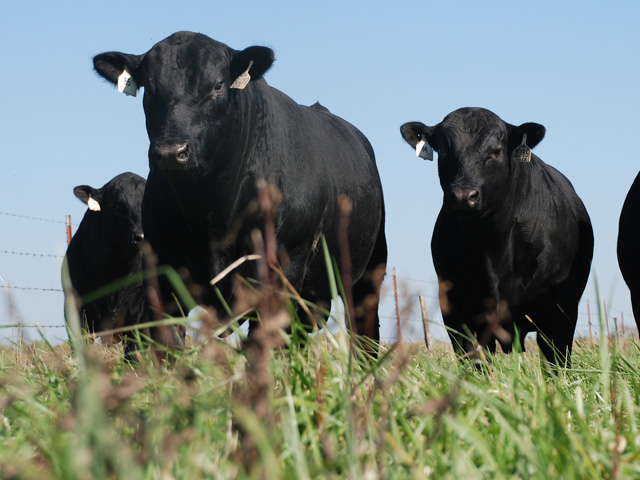Winter Bull Management Essential
Bulls Need Proper Nutrition, Protection From Cold During Winter
OMAHA (DTN) -- The management of bulls during winter is critical considering they contribute half the genetics to a cowherd and their fertility is important. Cow-calf producers need to contemplate several factors, including bull nutrition, protecting bulls from frostbite and performing a breeding soundness exam to assure semen quality.
In a webinar from the University of Nebraska-Lincoln (UNL) Extension BeefWatch webinar series, UNL Extension Cow-Calf Specialist Kacie McCarthy discussed how to assure bulls are well cared for in the winter so they are ready for the upcoming breeding season. Bulls need to be physically fit to do their jobs, she said.
BULLS LOSE WEIGHT
McCarthy said research shows bulls can lose anywhere from 100 to 400 lbs. during the breeding season, or about 10% to 15% of their body weight. Younger bulls are especially at risk of losing weight and, thus, body condition score (BCS), which should be at a 6.
Bulls must regain this weight before the next breeding season, so for most producers, winter is the time to get more weight on younger or thinner bulls, she said.
Younger bulls should be at 65% to 75% of their mature size at the beginning of the next breeding season. These bulls should gain 1.5 to 2 lbs./day to regain the lost weight, she said.
McCarthy said typically bulls are fed in separate pens or pastures. They should be watched closely to make sure they are maintaining body weight and not losing condition during the winter months.
Mature bulls can usually maintain weight on a 100% forage diet provided it is 7% crude protein and 50% total digestible nutrient (TDN), she said. Younger bulls, who are still growing, might need supplemental feeds.
"These bulls need a diet with a roughage at about 2% of their body weight," McCarthy said.
For example, a 1,400 lbs. bull would need 28 lbs. of dry matter intake a day and a higher crude protein level at about 8.0%. A grain (corn or distiller's grain) might need to be fed to achieve the higher protein levels, she said.
P[L1] D[0x0] M[300x250] OOP[F] ADUNIT[] T[]
Regardless of age, bulls should have access to a strong mineral program, according to McCarthy.
Mineral and vitamins help bulls grow and also help their performance during the breeding season.
Selenium is critical for normal spermatogenesis (sperm production) while zinc is critical for sperm-cell plasma membrane integrity, tail morphology (structure), and motility (movement). Iodine is a mineral that is shown to help alleviate foot rot, she said.
WATCH FOR FROSTBITE
McCarthy said cold weather can have negative effects on the fertility of bulls. Cold weather and wind chill can result in bull infertility with tissue damage to the scrotum.
DTN has written about this subject in the past. (https://www.dtnpf.com/…)
This tissue damage can cause blisters and scabs from the cold weather. Frostbite appears as discoloration, a scab or sloughing of the lower scrotal portion, she said.
Frostbite lowers semen quality in bulls, according to studies. The soundness score of semen quality of bulls with frostbite can drop significantly, she said.
McCarthy said bulls can recover from frostbite (spermatogenesis), but this process takes 61 days. Bulls should be protected from the elements with access to shelter or windbreak and they should have plenty of room available to them to get out of the cold. Bedding should also be provided to allow them to maintain body heat that can be lost from laying on frozen ground, she said.
UTILIZE a Breeding Soundness Exam
McCarthy recommends cow/calf producers use breeding soundness exams with their bulls. Research has shown that 57% of producers who purchase bulls have an exam, but only 17% of cow/calf operations had a breeding soundness exam done on bulls that were already in their operation, she said.
A breeding soundness exam is a uniform method of assessing a bull's likelihood of establishing pregnancy in an appropriate number of open, healthy and cycling cows and heifers in a defined breeding season, she said.
There are four components of the exam: a general physical exam, a scrotal circumference measurement, sperm motility and sperm morphology.
"It is recommended to do a breeding soundness exam four to six weeks prior to turn out for breeding," McCarthy said.
Bulls that don't pass can be retested if they had sustained some injury, for instance frostbite damage. Getting retested can show recovery from some injury, she said.
Conducting the test weeks ahead of breeding season gives producers enough time to purchase replacement bulls if animals don't pass. In addition to a breeding soundness exam, cow/calf producers should also complete other evaluations on their bulls before the next breeding season, McCarthy said.
These evaluations should include vaccinations, control of lice and flies and checking bulls' feet and legs.
The UNL BeefWatch Webinar Series is free and will begin at 8:00 p.m. CT on Tuesday, Dec. 15, and Jan. 5, 12, 19 and 26.
The series can be found at: https://beef.unl.edu/…
Russ Quinn can be reached at russ.quinn@dtn.com
Follow him on Twitter @RussQuinnDTN
(c) Copyright 2020 DTN, LLC. All rights reserved.






